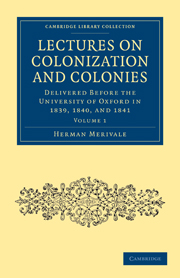 Lectures on Colonization and Colonies
Lectures on Colonization and Colonies I. The principal relics which Spain still possesses of her dismembered colonial empire, are the Philippine Islands in Asia, and Cuba and Portorico in the Gulf of Mexico. The Philippines are inhabited by a numerous and civilised Malay population, governed rather than colonised by a handful of Europeans; and, like our own possessions in the East Indies, hardly fall within the strict definition of a colony.
Towards the close of the last century, when our West India islands were rapidly advancing to the height of their prosperity, Cuba was comparatively of small importance. Its inhabitants were chiefly small landowners, cultivating the soil without the aid of slaves, for out of a population of 300,000, only a third belonged to the latter class: now its population probably amounts to a million, out of whom 400,000 are slaves. It exported upwards of 80,000 tons of sugar, or rather a greater quantity than Jamaica, before the emancipation of her slaves : at present the export from Cuba is greater still, and that from Jamaica smaller; while the superiority of the former island in the production of other colonial articles is far more decided. No less than forty new sugar estates were said last year to have been lately opened in Cuba. It is now, beyond contradiction, the wealthiest and most flourishing colony possessed by any European power.
To save this book to your Kindle, first ensure [email protected] is added to your Approved Personal Document E-mail List under your Personal Document Settings on the Manage Your Content and Devices page of your Amazon account. Then enter the ‘name’ part of your Kindle email address below. Find out more about saving to your Kindle.
Note you can select to save to either the @free.kindle.com or @kindle.com variations. ‘@free.kindle.com’ emails are free but can only be saved to your device when it is connected to wi-fi. ‘@kindle.com’ emails can be delivered even when you are not connected to wi-fi, but note that service fees apply.
Find out more about the Kindle Personal Document Service.
To save content items to your account, please confirm that you agree to abide by our usage policies. If this is the first time you use this feature, you will be asked to authorise Cambridge Core to connect with your account. Find out more about saving content to Dropbox.
To save content items to your account, please confirm that you agree to abide by our usage policies. If this is the first time you use this feature, you will be asked to authorise Cambridge Core to connect with your account. Find out more about saving content to Google Drive.